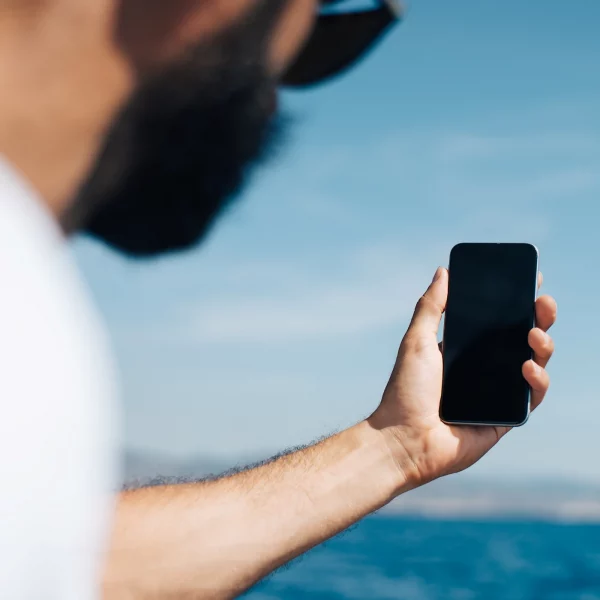Ship’s Maritime Mobile Roaming Network Causes Problems on Norfolk UK Coast

People living, visiting and working along the North Norfolk (England) coast recently ran into an unusual problem with mobile roaming after their mobile phones began connecting to the ‘Maritime‘ network. The seamless change meant that locals ended up being hit with high roaming charges for calls and data usage, as they were no longer connected to a domestic network.
In the past, there have occasionally been cases where people living in certain parts of the UK, such as Dover (Kent), have seen their mobile phones automatically connect to a mobile network in nearby France (e.g. certain atmospheric conditions, in the right location, can make French signals stronger than domestic ones). If you aren’t aware of this occurring, then it can lead to problems with dramatically inflated bills for calls, texts and 4G / 5G data (mobile broadband).
However, such issues would not normally be a risk for those on the North Norfolk coastline, which is too far from other countries. But according to the BBC News (credits to Chris for spotting), residents in the area have been left fuming over expensive mobile bills after their phones started roaming on to a Maritime network.
Advertisement
Mobile operators will send a message to warn when this happens, but such things are easily overlooked, and then you have to correct for it too (not so easy, until you move away from the area or manually select the network). As a result, some people have been charged ridiculous sums, such as £13 a minute for data or £3.35 a minute for calls. Somewhat more expensive than domestic UK tariffs.
North Norfolk MP, Steff Aquarone, said:
“This is not good enough. People need the clarity and reassurance they are not going to get charged an international fee just for using their phone on the cliffs of our beautiful county.”
On the one hand, some mobile operators, such as EE, have said that they may be able to refund customers who have been incorrectly charged. But the BBC’s piece seems to focus more on the fallout and less on identifying the cause, which would perhaps have been easier if they’d mentioned some dates and times.
As above, Norfolk is not near enough to any other foreign landmasses to be able to receive a domestic mobile signal from abroad. The culprit in this case is thus likely to be a ship sailing near the coast. Many Ferries and Cruise ships, which are often equipped with Satellite linked Maritime mobile networks, tend to only deploy these indoors or will disable them when close to port/shore, precisely to avoid this sort of issue.
The onboard Maritime networks they deploy will often also be using small, low-power cellular base stations (aka – picocells). But these are usually only capable of providing wireless network coverage over a very limited area, usually less than 200 metres, for both indoor and outdoor environments. One possibility is that a ship could have been running these at a higher power than would normally be allowed.
Advertisement
As a general rule, it’s almost always wise to turn ‘Data Roaming‘ off on your mobile phone / SIM profile, at least until you need it (e.g. when travelling abroad to a supporting country). But unfortunately, the same flexibility doesn’t typically extend to calls and texts (roaming is a core part of how mobile networks work), although mobile operators may allow you to disable international roaming via their App or Account portals.
Mark is a professional technology writer, IT consultant and computer engineer from Dorset (England), he also founded ISPreview in 1999 and enjoys analysing the latest telecoms and broadband developments. Find me on X (Twitter), Mastodon, Facebook, BlueSky, Threads.net and Linkedin.
« Parliament Debates Broadband and the Future of Terrestrial UK Television





















































This is why I specifically disable roaming, it ensures it never just kicks in for reasons like this.
As the victim has not left the UK and remains in the UK, it should be a case for OFCOM to investigate as licence conditions surly have been broken, the culprit should be easily identified and investigated.
This could have been done to generate undue profits, this cannot be allowed, if the ship concerned fails to engage, then the ship is banned from entering UK waters.
Chris, you make a good point (“culprit should be easily identified”):
– Identify consumer who has incurred extra charges
– MNO examines the CDRs (e.g. a single call)
– CDR meta data points to a maritime mobile network (e.g. WMS, MTN, Telenor etc.)
– My money is on Telenor Maritime given the ferries that might pass that location
– Telenor would then be able to tell which ship it was …
you think Telenor are deliberately interfering with UK mobile networks, risking their global reputation and standing to make a few hundred quid out of unsuspecting Norfolk residents? And that they are somehow in cahoots with a commercial shipping company to achieve this?
It’s exciting that you think Ofcom have the power to direct shipping movements.
It’s a bit far fetched.
“you think Telenor are deliberately”
No no, absolutely not. I’m not suggesting that at all.
This sounds like a misconfiguration.
“ This could have been done to generate undue profits, ”
I found it infuriatingly hard to properly disable international roaming on my EE phone. It was not an obvious location in the app, or the website, I had changed my phone settings to disable international roaming, but I think there was some app/EE feature that was connecting abroad and downloading a small amount of data that triggered a daily charge
In the end I found an annoyingly complicated solution, I just set my ‘monthly price cap’ to £0 for extras. It was quite funny to receive several messages telling me that due to my price cap I was not able to “use their services”. I have to be cynical about most mobile operators making it slightly tricky to avoid these charges (I’m a tech guy, so if I find it annoying, my gran won’t be able to figure it out)
Your phone should have the option to disable roaming and to disable data on a SIM. Since the first option wasn’t working for you (weird, but okay), disabling data on that SIM should work.
I can see why you’d want this to be on the network side, but the problem is that lots of people travel without thinking about this and if the settings are not on their phone, then they might be stuck without a way to contact the network, use their app, etc, to get roaming working. Of course the network doesn’t mind making some money, but there are good reasons for it to be like it is today.
Unless roaming becomes free for everyone, it’s hard to come up with one simple way that works for everyone, so your granny has no alternative but to explore her phone’s settings 😛
@ Anon
It’s quite easy, get a Vodafone Ireland plan or it MVNO Sky Mobile Ireland and you roam for free 😀
O2 used to have a package for those living in Northern Ireland that would treat accidental connections to O2 Ireland as not roaming
That’s not really an issue these days, as all of the major UK networks exempt roaming in Ireland from their roaming fees (and EU roaming is included on a lot of MVNOs anyway).
When visiting the Portrush area in Northern Ireland my phone connected to a network in the South of Ireland. Incurred roaming charges at that time. Good idea to keep roaming off, and turn on only when really needed.
Do all UK networks not allow use of your allowances FOC in ROI?
Definitely the case on EE, VF & O2. Unsure about Three but think they do as well.
@Matt: This didn’t happen to me recently, but I was with O2 buisness at the time, and was charged. Things may be different now, as you say.
I was hit by this no joke. I was near the sea at Hunstanton and I was on Honest Mobile which requires roaming. I wondered why apps were working that should not be..
Several commenters have suggested that it might be a ferry.
If you were at Hunst’on that would be most unlikely.
My guess is that the culprit is a Wind-turbine maintenance vessel.
This is certainly a very interesting story, but it may have another twist.
In fact, based on my own research and what I have read online, the mentioned network does not appear to come from a ship at all. Its a fixed 4G network called Tampnet (tampnet.com) that covers some areas of the North Sea (targeted at offshore windfarms, oil rigs, etc). I’ve picked it up myself on a good few occasions.
That’s why its such an ongoing problem in this area, because that network is on 24/7 and will sometimes have a stronger signal than a UK provider on the Norfolk coastline, causing your phone to switch without you knowing.
there was actually a very long thread on the EE Community forum written by oil rig workers, about how EE used to zero-rate all data usage on this network, and then one day suddenly decided to classify it as “Maritime satellite” even though it was in fact run from fixed base stations. The side of the story written about there was that apparently the provider (Tampnet) were shocked to hear of EE’s decision but said it was out of their control. So it may in fact be the mobile operators taking the profits, while they pay cheap wholesale rates to Tampnet and blame anyone but themselves.
The Maritime network bit comes from the network code, which is now an internationally agreed standard (specifically so it can be billed at a premium, and scupper things like WiFi calling). If it is infact Tampanet they can easily solve this by putting an upper timing advance limit on the cell.
I wondered if it was Tampnet. The idea of a timing advance is a non-starter as the whole point of the network is to provide coverage over large areas of the North Sea and they’re probably using omni-directional antennas (they could and maybe should change that if they are, but it’s not an easy thing to do especially in that environment).
The coverage map on their website does tie up with the reported issues.
Tampnet appear to be using network code 242-99. This is a Norway code not maritime so should be included in EU roaming. If EE are not honouring that then that’s an EE issue.